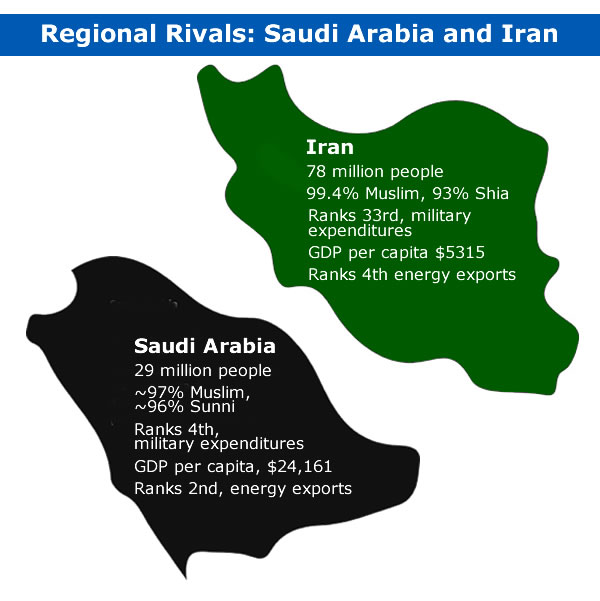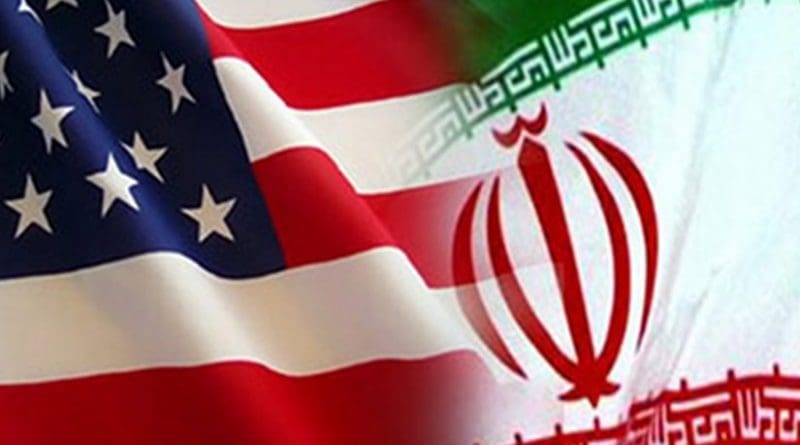Iran Nuclear Deal Fuels Tension With Saudi Arabia Inflaming New Conflicts – Analysis
The Iran nuclear deal was supposed to ease tensions, but Saudi Arabia seems frantic to antagonize its rival.
By Mohammed Ayoob*
Just as it seemed that tensions in the Persian Gulf might be easing with the signing of the nuclear deal, aimed at effectively curbing Iran’s capacity to weaponize, the political temperature in the energy-rich region has risen to unprecedented heights. Paradoxically, the very success of the deal contributes to escalating tensions. Iran’s Arab adversaries in the Persian Gulf, above all Saudi Arabia, prefer an ostracized nuclear Iran over a competitive oil producer and responsible regional power, and now try a series of policies forcing the United States to take sides. Ironically, anti-American hardliners in Iran have proved to be their unintended allies.
By all accounts Iran has implemented its part of the deal, including decommissioning the Arak plutonium facility by removing the reactor core, shipping most of its low-enriched uranium to Russia and reducing the number of centrifuges installed at the Fordow and Natanz sites. These actions foreclose any possibility of Iran taking either the uranium or the plutonium route towards the acquisition of nuclear weapons in the near future.
Furthermore, Iran has taken these steps in far less time than expected in the hope that sanctions would be removed speedily. The International Atomic Energy Agency announced on Saturday its verification that Iran has met all obligations under the nuclear agreement. Following this announcement, the European Union and the United States declared that nuclear-related economic sanctions imposed on Iran will be removed. This allows Iran to access approximately $100 billion dollars of frozen assets, sell oil freely on the international market, and use the international banking system for financial transactions – in short, to act as a normal member of the international economic system.
These proximate consequences apart, the most important outcome of the nuclear agreement and its quick implementation is likely to be rapprochement between the United States and Iran on mutually beneficial terms. This possible scenario has alarmed Iran’s Arab adversaries.
Having failed to derail the nuclear deal, Riyadh has taken recourse in policies that increase tensions with Iran, anticipating that in a showdown between the two regional powers Washington will choose a longstanding ally over a newfound partner. If this turns out to be the case, it would scuttle any possibility of a wide-ranging understanding between the US and Iran on broader regional issues such as the Islamic State, Syria and Yemen where both sides have overlapping interests.
Saudi Arabia’s brazen intervention in Yemen against the Houthis in the form of air attacks in particular was undertaken with this goal in mind. Washington had grave reservations about such a move both because it forced the Houthis to move closer to Iran and pushed Riyadh into a de facto alliance with Al Qaeda in Yemen, which also opposes the Zaidi Houthis.
The execution in early January of outspoken Saudi Shia cleric and political activist Sheikh Nimr al-Nimr prompted a predictable Shia reaction, providing Saudi Arabia and its Gulf allies an excuse to cut off diplomatic relations with Iran and escalate the war of words. Once again, this put the United States, which had earlier warned Riyadh on the negative repercussions of Nimr’s execution, in a tough spot.
The drama surrounding the execution helped consolidate Sunni support for Riyadh in the Gulf and wider Middle East by portraying its rivalry with Iran in sectarian terms. However, this Saudi action was taken in utter disregard of American interests in the Middle East. The negative fallout has been particularly acute in Iraq, where the United States is engaged in a delicate balancing act between the two sects. Sectarian strife strengthens the appeal of extremism among Sunni Arabs with damaging consequences for the US-led war against the Islamic State while making a negotiated settlement in Syria more difficult to achieve.
Saudi policymakers are so fixated on Iran that negative effects of their policies do not seem to worry them much. Negative external consequences notwithstanding a major reason for such policy choices is the attempt to consolidate domestic support for the Saudi regime during a difficult power transition and severe economic downturn. The former is the result of power passed on to a generation of younger princes handpicked by the new King Salman and his coterie. A key member of the inner circle is his 30-year-old son Deputy Crown Prince Mohammed bin Salman, who is simultaneously defense minister and economic czar of the kingdom.
The domestic economic dimension weighs more heavily than politics. The precipitous decline in oil prices from $110 a barrel in 2014 to less than $30 today has forced the Saudi regime to cut longstanding subsidies for citizens thus eroding the legitimacy of absolutist rule. Simultaneously, defense and security spending has grown from 7 percent of GDP in 2012 to 10 percent in 2015 and is expected to rise further this year primarily because of the Saudi intervention in Yemen. Moreover, the budget deficit is around 15 percent of GDP; foreign reserves have fallen by $100 billion to $650 billion.

These economic travails have led some in the regime, especially the deputy crown prince, to openly contemplate the unthinkable: namely, gradual privatization of Saudi Aramco, the world’s largest producer of oil.
As the economy falters, the Saudi regime seems to take aggressive stances in the foreign-policy arena in order to impress its domestic constituency, relying on sectarian rhetoric to justify policies and expenditures. Iran is a convenient whipping boy for this strategy. In the long run such a policy is likely to be counterproductive, but more alarming for the short run is a conflagration in the Gulf that may spiral out of control.
Iran’s government has tried to avoid stoking the fires in the Persian Gulf, though some elements within the Iranian polity have taken to aggravating tensions. The burning of the Saudi embassy’s annex in Tehran in retaliation for Nimr’s execution, presumably by hardliners interested in discrediting President Rouhani, is a case in point. Anti-Saudi rhetoric periodically emanating out of Tehran, as that following the Haj stampede in September 2015 and deaths of more than 400 Iranian pilgrims, demonstrates the visceral anti-Saudi feelings harbored by a segment of the Iranian populace. Above all, conservative hard-liners who could not derail the nuclear deal because of the Supreme Leader’s backing of President Rouhani and Foreign Minister Javad Zarif find the current tensions with Saudi Arabia a convenient way to vent their anger as well as delay if not prevent the impending rapprochement between Washington and Tehran.
However, the difference between the two countries is that the mainstream elements in power in Tehran are not interested in escalating tensions however much they may condemn the recent turn in Saudi policy. In Saudi Arabia, those who hold the reins of power find it profitable to demonize Iran and escalate tensions to serve their own short-term ends.
The difference can be best explained by the fact that Iran is a rising power that perceives historical trends going in its favor. The country can, therefore, adopt a prudent wait-and-see policy. Saudi Arabia, on the other hand, sees time running out as Iran consolidates its position in the region and vis-à-vis the United States and is tempted to adopt reckless policies with damaging effects on the energy-rich region as well as on American interests in the wider Middle East. Policymakers in Washington must keep this difference in mind when formulating strategies – and must find a way to tamp down tensions by counseling Riyadh against rash actions. Failure to do so could lead to a regional catastrophe.
*Mohammed Ayoob is University Distinguished Professor Emeritus of International Relations, Michigan State University, and author most recently of Will the Middle East Implode? (Polity, 2014).

